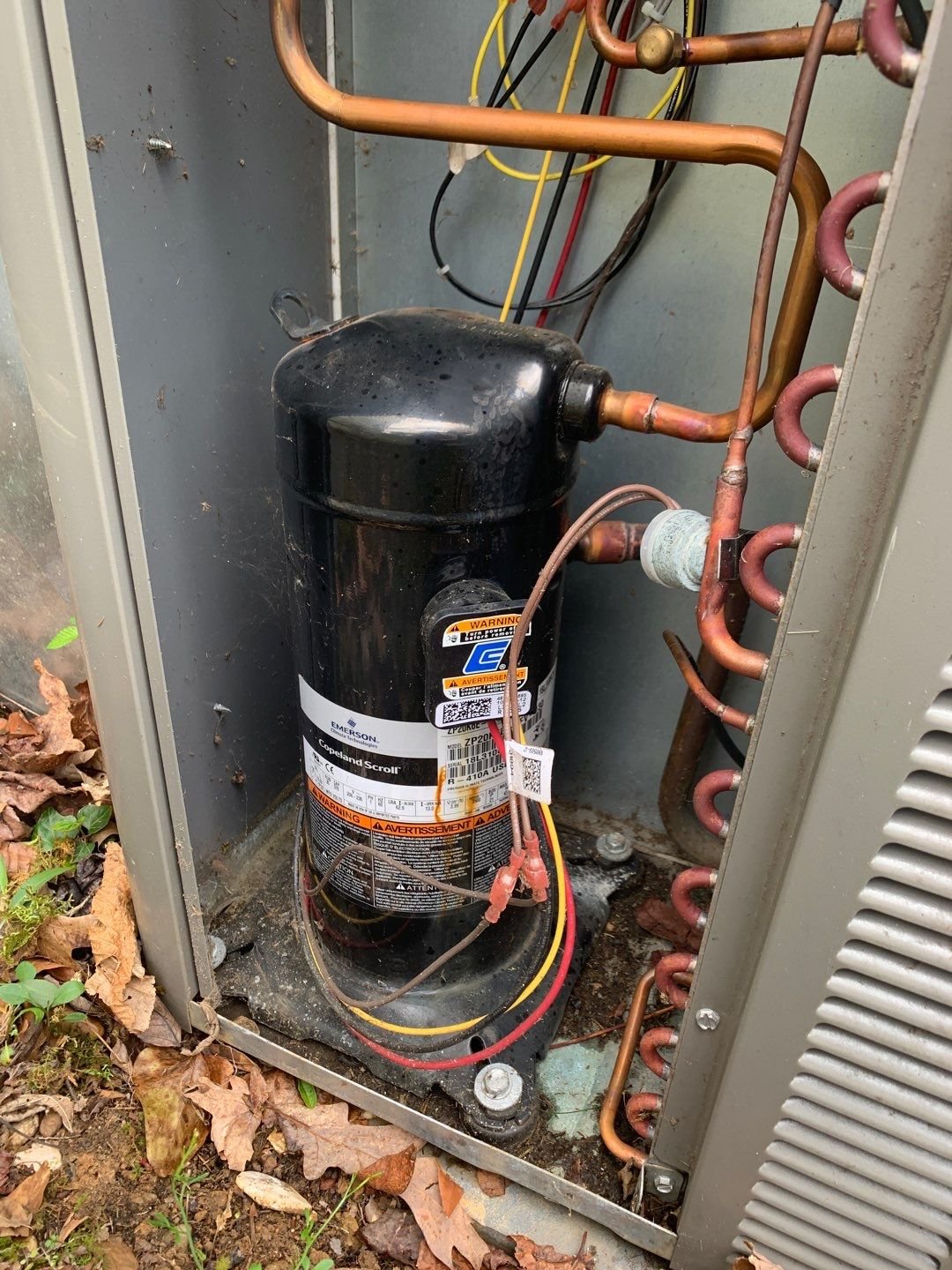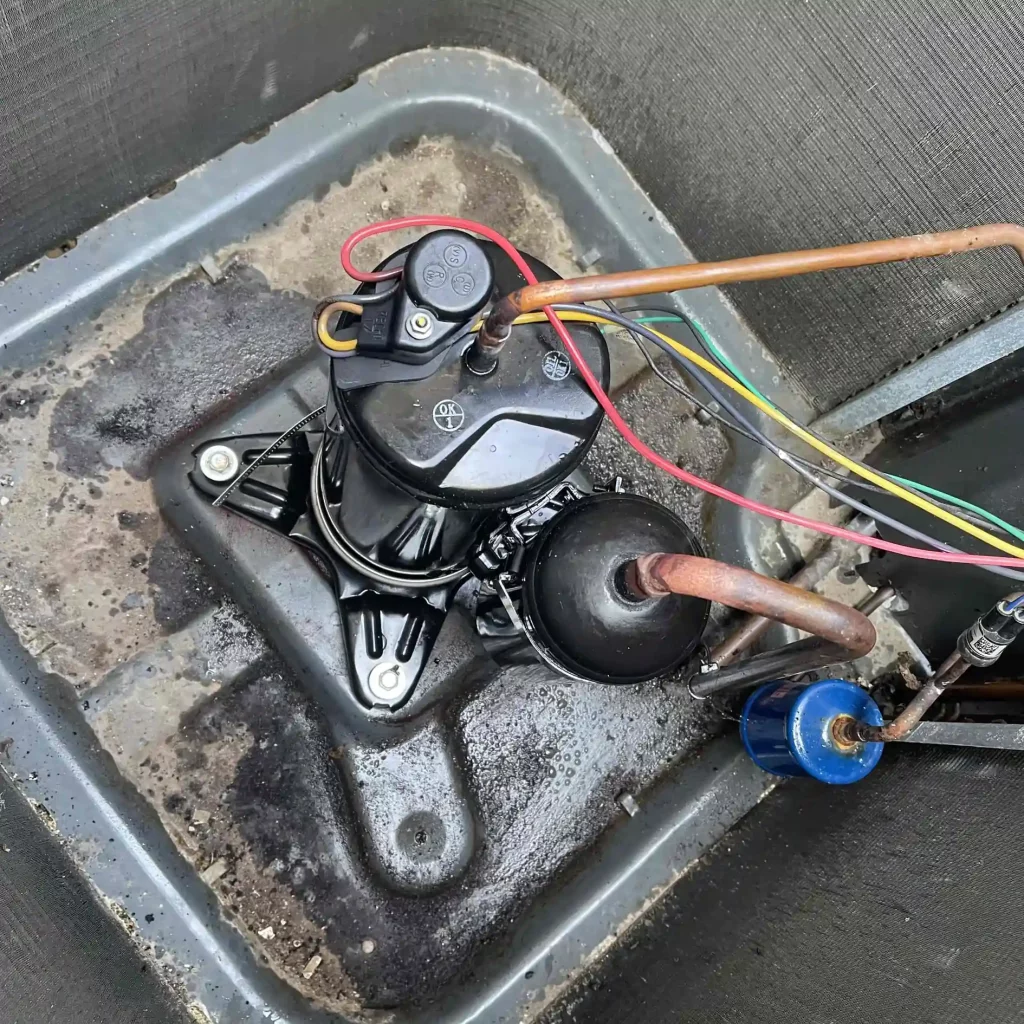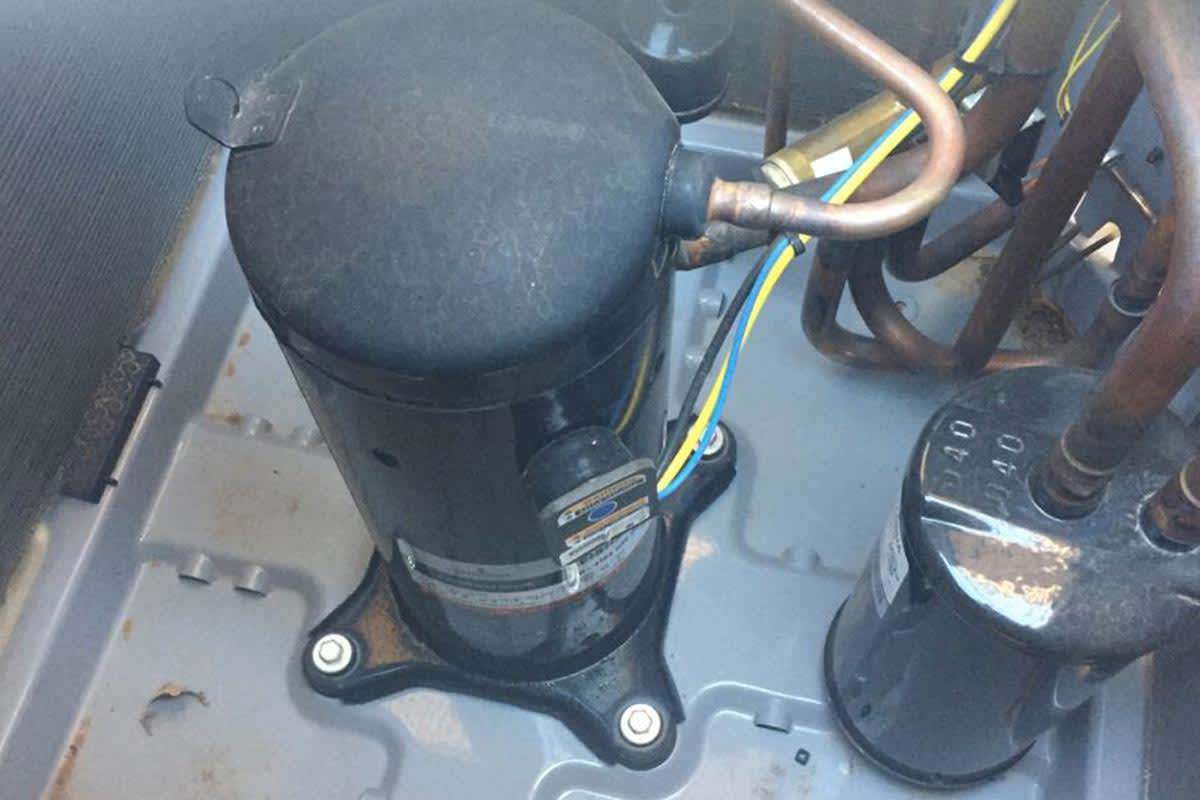The cost of an air conditioner compressor typically ranges from $300 to $1,200. Factors influencing this price include brand, model, and installation complexity.
Air conditioner compressors play a vital role in cooling systems. They compress refrigerant, enabling effective heat exchange and maintaining comfortable indoor temperatures. Over time, wear and tear can lead to compressor failure, necessitating replacement. Understanding the costs involved helps homeowners budget for repairs or replacements.
Prices vary based on the compressor type and labor costs in your area. Choosing the right compressor can improve efficiency and extend your system’s lifespan. This guide will explore factors affecting compressor prices and provide tips for making an informed decision.

Credit: www.bluewaterclimatecontrol.com
The Heart Of Cooling: Ac Compressor Costs
The air conditioner compressor is vital for effective cooling. It compresses refrigerant and circulates it through the system. Understanding its costs helps in budgeting for repairs or replacements.
Key Functions Of An Ac Compressor
The AC compressor performs several crucial functions:
- Refrigerant Compression: It compresses low-pressure refrigerant gas.
- Heat Transfer: It helps in transferring heat from inside to outside.
- Circulation: It moves refrigerant through the entire cooling system.
- Pressure Regulation: It maintains appropriate pressure levels for efficient operation.
These functions make the compressor essential for cooling efficiency.
Price Range For Different Types
AC compressor costs vary based on type and size. Here’s a quick overview:
| Type of Compressor | Estimated Cost |
|---|---|
| Reciprocating Compressor | $300 – $700 |
| Screw Compressor | $1,000 – $5,000 |
| Scroll Compressor | $400 – $1,200 |
| Rotary Compressor | $200 – $800 |
Costs may also include installation fees. Always get multiple quotes for accurate pricing.
Types Of Ac Compressors And Their Cost Implications
Understanding the different types of AC compressors helps in cost analysis. Each type has its own price range and benefits. Let’s explore two popular types: Scroll compressors and Reciprocating compressors.
Scroll Compressors: A Modern Choice
Scroll compressors are known for their efficiency and quiet operation. They use two spiral-shaped scrolls to compress refrigerant. This design allows for smoother operation and less vibration.
Cost Implications:
- Initial Cost: Typically higher than other types.
- Energy Efficiency: Lower energy bills over time.
- Maintenance: Requires less frequent servicing.
| Feature | Scroll Compressors |
|---|---|
| Initial Cost | $1,200 – $2,500 |
| Energy Efficiency | High |
| Maintenance | Low |
Reciprocating Compressors: Traditional And Affordable
Reciprocating compressors are the most common type. They use pistons to compress refrigerant. This design is simple and reliable, making it a popular choice.
Cost Implications:
- Initial Cost: Generally lower than scroll compressors.
- Energy Efficiency: Moderate, leading to higher bills.
- Maintenance: More frequent servicing needed.
| Feature | Reciprocating Compressors |
|---|---|
| Initial Cost | $700 – $1,500 |
| Energy Efficiency | Moderate |
| Maintenance | High |
Factors Influencing Ac Compressor Prices
Understanding the factors that influence AC compressor prices helps in making informed decisions. Several elements impact how much you will pay for a new compressor. These elements include brand, quality, capacity, and size.
Brand And Quality: The Price Determinants
The brand of the AC compressor can significantly affect the price. Well-known brands often charge more due to their reputation. High-quality brands offer better reliability and efficiency. Here are some popular brands:
- Carrier: Renowned for durability and performance.
- Trane: Known for energy efficiency and reliability.
- Lennox: Offers advanced technology and high performance.
- Goodman: Budget-friendly with solid performance.
Quality also plays a crucial role in pricing. A higher quality compressor often costs more but lasts longer. This can save money in the long run.
Capacity And Size: Matching Your Cooling Needs
The capacity of the AC compressor is vital for efficient cooling. It is measured in British Thermal Units (BTUs). A larger capacity usually means a higher price.
| AC Size (BTUs) | Typical Price Range |
|---|---|
| 5,000 – 7,000 BTUs | $150 – $300 |
| 8,000 – 12,000 BTUs | $300 – $600 |
| 13,000 – 18,000 BTUs | $600 – $1,200 |
Choosing the right size is crucial. An oversized compressor wastes energy. An undersized one struggles to cool effectively. Consult a professional to determine the best capacity for your needs.
In summary, brand, quality, capacity, and size significantly influence AC compressor prices. Understanding these factors ensures you make the best choice for your home.

Credit: atlasacrepair.com
Labor Costs: Understanding Installation Expenses
Installing an air conditioner compressor involves significant labor costs. Understanding these expenses helps homeowners budget effectively. Labor costs vary based on several factors, including the choice of installation method and geographical location.
Professional Installation Vs Diy
Choosing between professional installation and DIY can impact costs greatly. Here’s a breakdown:
- Professional Installation:
- Typically costs between $100 to $300 per hour.
- Includes skilled labor and expertise.
- Offers warranties on work performed.
- DIY Installation:
- May save labor costs.
- Requires tools and knowledge.
- Risk of improper installation can lead to future costs.
The Region Factor: How Geography Impacts Cost
Geographical location affects labor rates. Different regions have varying costs due to demand and availability. Here’s a simple table showing average installation costs by region:
| Region | Average Labor Cost |
|---|---|
| North | $150 – $300 |
| South | $100 – $250 |
| East | $120 – $280 |
| West | $130 – $290 |
Consider local market rates before making a choice. Researching helps ensure that you select the best option for your budget.
Energy Efficiency: Investing In Sustainable Cooling
Choosing an energy-efficient air conditioner is vital. It helps save money and protects the environment. An efficient unit cools well while using less energy. Understanding energy ratings can lead to better choices.
Seer Ratings And Compressor Efficiency
SEER stands for Seasonal Energy Efficiency Ratio. It measures cooling output divided by energy consumed. Higher SEER ratings mean better efficiency. Here’s a quick overview:
| SEER Rating | Efficiency Level | Typical Usage |
|---|---|---|
| 13-15 | Moderate | Basic cooling needs |
| 16-18 | High | Optimal comfort |
| 19+ | Very High | Luxury efficiency |
Investing in a unit with a higher SEER rating pays off. A more efficient compressor uses less energy. This leads to a significant reduction in monthly bills.
Long-term Savings Through Energy-efficient Models
Energy-efficient air conditioners offer numerous financial benefits:
- Lower utility bills
- Reduced environmental impact
- Increased home value
- Less frequent repairs
Here’s how savings add up over time:
- Lower initial costs may seem attractive.
- Energy-efficient models save up to 50% on energy bills.
- Tax rebates may be available for high-efficiency units.
- Longer lifespan means fewer replacements.
Investing in energy-efficient air conditioners is smart. It leads to comfort, savings, and a greener planet.
Warranties And Maintenance: Protecting Your Investment
Investing in an air conditioner is significant. Proper warranties and maintenance can protect this investment. Understanding these aspects helps save money and ensures long-term performance.
The Importance Of A Solid Warranty
A strong warranty is crucial for any air conditioner compressor. It provides peace of mind and protects against costly repairs. Here are key points to consider:
- Duration: Check how long the warranty lasts.
- Coverage: Understand what parts are covered.
- Transferability: Know if the warranty transfers to new owners.
- Claim Process: Review the steps for filing a claim.
A solid warranty can save you money. It can cover parts and labor costs. This protection adds value to your air conditioner purchase.
Routine Maintenance To Avoid Hefty Costs
Regular maintenance prevents major problems. It keeps your compressor running smoothly. Here are simple Maintenance tips:
- Change the air filter every 1-3 months.
- Clean the outside unit to remove debris.
- Schedule professional inspections once a year.
- Check refrigerant levels regularly.
Ignoring maintenance can lead to costly repairs. Routine care helps extend the life of your unit. Set reminders for maintenance tasks to stay on track.
| Maintenance Task | Frequency | Importance |
|---|---|---|
| Change Air Filter | Every 1-3 months | Improves air quality and efficiency |
| Clean Outdoor Unit | Annually | Prevents overheating and ensures airflow |
| Professional Inspection | Once a year | Identifies potential issues early |
| Check Refrigerant Levels | Twice a year | Ensures optimal cooling performance |
When To Repair Vs Replace: Cost-effective Decisions
Deciding whether to repair or replace your air conditioner compressor can be challenging. Understanding the costs involved helps in making informed choices. Here, we break down key factors to consider.
Assessing The Condition Of Your Ac Compressor
Before making a decision, evaluate the condition of your compressor. Look for these signs:
- Age: Compressors over 10 years old often need replacement.
- Frequent Repairs: Multiple repairs in a year can add up.
- Noisy Operation: Loud or unusual noises indicate potential issues.
- Reduced Cooling: Less efficient cooling may signal a failing compressor.
Consider a professional inspection. They can provide a thorough assessment. This evaluation can save you from costly mistakes.
Calculating The Break-even Point
Understanding your costs helps in deciding. Calculate the break-even point. Use this simple formula:
| Repair Cost | Replacement Cost | Estimated Lifespan (Years) |
|---|---|---|
| $300 | $1,500 | 5 |
Example:
- Repair cost: $300
- Replacement cost: $1,500
- Estimated lifespan after replacement: 10 years
Calculate the annual cost:
- Repair: $300 / 1 year = $300
- Replacement: $1,500 / 10 years = $150
Replacement costs less over time. This calculation helps you decide wisely.
Finding Deals And Discounts: Smart Shopping For Ac Compressors
Saving money on an air conditioner compressor requires smart shopping. Knowing where to find deals can significantly reduce costs. Look for seasonal sales, online promotions, and local discounts. This guide will help you navigate the best options.
Seasonal Sales And Promotions
Seasonal sales are a great time to buy an AC compressor. Retailers often offer discounts during these times:
- Spring Sales: Prepare for summer with early bird discounts.
- Summer Clearance: Clear out old stock as new models arrive.
- Black Friday: Major discounts on appliances, including AC units.
- End-of-Season Sales: Take advantage of markdowns in fall.
Check local advertisements and online platforms for announcements. Signing up for newsletters can also help you stay informed.
Online Vs Offline: Where To Find The Best Prices
Choosing between online and offline shopping can affect your savings.
| Shopping Method | Pros | Cons |
|---|---|---|
| Online |
|
|
| Offline |
|
|
Evaluate both options. Compare prices, check for discounts, and read reviews. This strategy ensures you find the best deal on your AC compressor.
Future Of Cooling: Innovations In Ac Compressors
The cooling industry is evolving rapidly. New technologies are changing how air conditioners operate. Innovations in AC compressors promise better efficiency and lower costs. Understanding these advancements is crucial for consumers and manufacturers alike.
Emerging Technologies In Compressor Design
Innovations are reshaping compressor designs. Here are some exciting technologies:
- Variable Speed Compressors: Adjusts speed based on cooling needs.
- Inverter Technology: Reduces energy consumption significantly.
- Smart Compressors: Uses AI for optimal performance.
- Eco-friendly Refrigerants: Reduces environmental impact.
These technologies lead to:
- Lower energy bills.
- Quieter operation.
- Extended lifespan of units.
Investing in these technologies benefits both consumers and the environment. They make cooling more efficient and sustainable.
The Impact Of Regulations On Future Costs
Regulations play a big role in AC compressor costs. New laws aim to reduce energy consumption and greenhouse gases. Here’s how regulations affect costs:
| Regulation Type | Effect on Costs |
|---|---|
| Energy Efficiency Standards | Higher initial investment but lower operational costs. |
| Refrigerant Regulations | May increase costs due to new refrigerant technologies. |
| Emission Controls | Encourages innovation, potentially lowering costs long-term. |
Consumers should stay informed about these changes. Understanding regulations helps in making better purchasing decisions.
Financing Options For Ac Compressor Purchases
Purchasing an air conditioner compressor can be a big expense. Many homeowners seek financing options to make it affordable. Understanding these options can help you choose the best plan for your budget.
Credit Financing And Loans
Credit financing and loans are popular methods for purchasing an AC compressor. Here are some key points:
- Low Monthly Payments: Spread the cost over time.
- Interest Rates: Rates can vary based on credit score.
- Flexible Terms: Choose terms that fit your financial situation.
Many companies offer credit options for compressor purchases. You can apply online or in-store. Approval often depends on your credit history.
Rent-to-own Programs: Pros And Cons
Rent-to-own programs allow you to rent an AC compressor with the option to buy it later. Here are the pros and cons:
| Pros | Cons |
|---|---|
|
|
Rent-to-own can be a good option for some. Evaluate the terms carefully before deciding.

Credit: homeguide.com
Frequently Asked Questions
What Factors Affect Air Conditioner Compressor Cost?
Air conditioner compressor costs can vary based on several factors. These include the brand, model, efficiency rating, and installation complexity. Additionally, local labor rates and any necessary repairs can influence the overall price. Researching different options can help you make an informed decision.
How Much Does A New Compressor Typically Cost?
The cost of a new air conditioner compressor typically ranges from $300 to $1,200. This price often excludes installation fees, which can add another $200 to $500. Factors like brand and model play a significant role in determining the final cost.
Always get multiple quotes for the best deal.
Is It Worth Replacing An Air Conditioner Compressor?
Replacing an air conditioner compressor can be worthwhile if the unit is relatively new and in good condition. If the repair costs exceed 50% of a new system, consider replacement. A new compressor can extend the unit’s lifespan and improve energy efficiency, ultimately saving you money.
How Long Does An Air Conditioner Compressor Last?
An air conditioner compressor typically lasts between 10 to 15 years. Proper maintenance can help prolong its lifespan. Factors like usage frequency and environmental conditions also affect longevity. Regular check-ups can identify issues early, ensuring your compressor operates efficiently for years.
Conclusion
Understanding air conditioner compressor costs is essential for informed decision-making. Prices can vary based on brand, efficiency, and installation. Regular maintenance can also impact long-term expenses. Investing in quality components may save you money in the future. Always compare options to find the best fit for your needs and budget.

